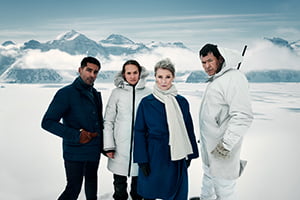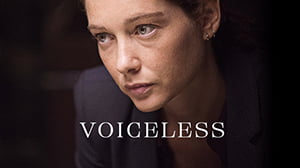Theme Festival - Non-English-Language Drama

While the coronavirus pandemic forced countless productions to be delayed or suspended, the market for non-English-language drama continues to attract new audiences. But what new series are coming to market and how are distributors responding to changing industry dynamics? Michael Pickard reports.
For three months, the television drama industry has been on pause. Despite some rare exceptions, sets have been left deserted as the global coronavirus pandemic saw lockdowns and quarantines brought into force.
Now, however, the green shoots of recovery are starting to appear, with filming resuming across Scandinavia, Australia and New Zealand, while other national bodies are setting out the requirements needed to protect the health and well-being of cast and crews, with particular regard to social distancing.
But while new content may be delayed, television drama has never been more in demand as broadcasters and SVoD platforms serve captive audiences stuck at home, with viewers tuning into new shows or hoping to catch up on those they might have missed.
That is especially true for non-English-language dramas, which are continuing to build on their increasing popularity as stories move beyond crime thrillers such as France’s Braquo and Engrenages (Spiral) and Nordic noirs including Forbrydelsen (The Killing) that began the spike in popularity of imported series more than a decade ago.
“Traditionally, especially in the Anglo-Saxon world, foreign-language series automatically meant subtitles, which means maybe more highbrow, arty stuff that comes from the theatrical experience,” explains Oliver Bachert, exec VP of international sales and acquisitions at Germany’s Beta Film.
“But a development that kicked in some time ago on linear broadcasters like the BBC was their continuous foreign-language slots. Other broadcasters also embraced non-English-language drama and that has been accelerated by the streamers.”
But he says the biggest development in this space has been the increase in the quality of productions as different markets around the world begin to mature and can now complete against established exporters. “Spain, France, Italy and more recently Eastern European countries are picking up productions that have more global reach, while Russia is a market we’re working closely with,” Bachert continues. “It has become less relevant what language a show is shot in, which just breaks it down to whether it’s a good show or not.”

New titles on Beta’s slate include German period drama Der Überläufer (The Turncoat, 4×60’) and Spanish series La Unidad (The Unit, 12×60’) and Dime Quien Soy (Tell Me Who I Am, 9×60’), alongside evergreen series such as Babylon Berlin and Gomorrah.
“We were fortunate that a lot of our productions were in post-production so shooting was done or almost done, which allowed us to keep the content pipeline working,” Bachert says of how Beta’s slate has been affected by the pandemic. “The impact on our productions were somehow limited, which helps us on the licensing side. There’s a huge volume of content that has been delayed, which could have an impact on shows being ready in English or not. We’ll have to see how the delays affect the availability of product.”

Emmanuelle Bouilhaguet, MD of Paris-based Lagardère Studios Distribution, agrees the particular language of a show is becoming less important as viewers, and younger viewers in particular, become more open to watching series with subtitles or dubbing.
“When you show broadcasters some European content nowadays, fewer of them think you’re crazy. Of course, they prefer UK series because the production is very good but the quality of European productions is really rising,” she says. “English-language series can open certain territories but in the situation we face right now, there are new opportunities with certain territories and broadcasters that have previously been reluctant [to air non-English language series] because they now need to find content. Fifteen years ago, very few series were broadcast internationally. Today, there are many big European series that succeed.”

Top of Lagardère’s current slate are Dutch action thriller Commandos (10×45’) and Swedish drama The Machinery (8×45’), while the distributor hopes younger-skewing Spanish series Merlí: Sapere Aude (8×50’) can draw family audiences.
“European production is really rising in terms of quality but there are so many series on the market. Only the very best will succeed,” Bouilhaguet says. “As a distributor now we have to be very selective. I don’t care about volume, I don’t need 20 new series but I need the best and there is a lot of competition.
“Buyers will be more open-minded because they need new content but they will also focus on the strongest series. But what’s also working more and more are adaptations of European series in the US, the UK or elsewhere. That’s a very strong market for us now.”
While English-language crime dramas continue to be popular around the world, similar shows in other languages are now also hot properties, especially where dubbing is preferred over subtitles.

“Then it doesn’t really matter what language it’s produced in because they’re going to dub it into French, German or Spanish,” notes Banijay Rights’ head of scripted Caroline Torrance. “For a while the dubbing studios were shut down [due to the pandemic] so that was an issue, but they’re starting to reopen again. There’s definitely been an increase in demand for series because to begin with, schedules were taken up with news programming and Covid documentaries. People are beginning to get bored of that now and they want to see some other dramas.”
Banijay is selling Swedish crime drama We Got This! (6×45’) as well as Belgian series GR5: Into The Wilderness (8×50’), Swedish eco-thriller Tun Is (Thin Ice, 8×45’) and Swedish police procedural Backstrom (3×90’/6×45’), while second seasons of Welsh series Bang (6×50’) and Swedish cop series Rebecka Martinsson (8×45’/4×90’) are also available.
“In terms of genres, you’d think people might want to see comedy or uplifting shows or something more cheerful than murder, but I’m not seeing any change in the demand for thrillers and police crime series. People seem to be able to transport themselves to a different world with a whodunnit,” Torrance says.

“I’m feeling really positive about our slate this year. It will be nice when we can all get together again, take our buyers out for lunch and have a sociable time. But in the meantime, business is carrying on and we’re working very effectively from home and using everything technology can afford us to keep contact with the buyers.”
It was at the end of April that British distributor DRG rebranded under the name of its parent company, NENT Studios UK. But it’s business as usual for exec VP of content Dave Clarke, who has found non-English-language drama booming amid the number of new slots opening up to it on traditional linear and SVoD platforms.
“Whether you’re going to see foreign-language series forced into some of those more premium slots because of the shutdown, we don’t know the answer to that yet because we don’t know how quickly and smoothly production will restart, in the UK in particular, and what the time-lag will be,” he says. “It’s possible but whether you’ll see the major commercial broadcasters doing it remains to be seen.”

Upcoming series for NENT include Finnish series The White Wall, which blends mystery and science-fiction, and For Life, a Norwegian show that aims to put a fresh spin on police procedurals. It is also shopping award-winning July 22, about the Norwegian terrorist attacks in 2011.
“The SVoDs are natural risk-takers, commercially and editorially. It would be quite a leap for a significant amount of foreign-language drama to come into mainstream schedules outside of the mega brands that have been established over the years,” Clarke continues.
“I’d like to think that’s something that will happen. The quality is there, the talent is there. There’s no reason they shouldn’t and perhaps the experience of watching Money Heist [aka Spanish thriller La Casa de Papel] on Netflix would lead a lot of viewers to tune into subtitled drama on terrestrial networks. If it takes a global pandemic to push that genre into mainstream schedules, so be it.”
Fremantle’s creative director of global drama Christian Vesper is also hopeful foreign-language drama might soon become a regular sight on broadcast schedules, though he admits networks that don’t already air this type of content are unlikely to suddenly embark on a shopping spree in that particular market. “Certainly, they’ve looked and screened things in ways they wouldn’t have done before but it’s still the same players that are really going to be interested in foreign-language projects,” he says.

However, he claims sellers are seeing a number of clients coming back for a second look at some of the series they might have missed the first time around. For Fremantle, that might include Chilean psychological thriller La Jauría, Norwegian series Exit and Italy’s My Brilliant Friend. Upcoming titles include Benjamin Netanyahu biopic Bibi, Danish true crime drama The Investigation and No Man’s Land, a multi-national thriller set against the backdrop of the Syrian war.
“This pandemic has been a totally unexpected event and it’s required all the buyers to have different ideas from where they can pool content,” Vesper says. “It has enabled a lot of broadcasters to take risks on foreign-language shows, whatever their native language, that they wouldn’t have done in the past. Netflix has always been able to take that risk because of the way the platform works; this [pandemic] now gives the more traditional networks that opportunity.
“That side of the business has been busy, the calls have been coming in and there’s a lot of curiosity about some of our foreign-language titles that would have been considered more local or maybe harder to move in the past.”
While buyers might have been expected to seek out lighter or more uplifting content to counter the grim outlook of Covid-19, Vesper echoes Beta’s Bachert, Lagardère’s Bouilhaguet and Banijay’s Torrance when he notes that broadcaster are just looking for addictive storytelling, in whatever genre or language it might appear.
“We keep worrying the market for non-English-language drama will slow down but we keep moving projects. From our perspective, it’s about making sure we’re working with the best talent and those that have a passion behind them are the ones that seem to resonate. I don’t think it’s slowing down. It’s that constant push and pull between buyers being pressured from their owners to be as mainstream as possible yet the market is more diverse than that. Most commissioners do want what is most interesting on the channel.”

Another UK distributor, ITV Studios (ITVS), is also moving into non-English-language drama, with Voiceless (Cattleya for Rai Uno in Italy), Une Belle Histoire (Tetra Media Fiction, Monogo for France 2), Balthazar (Beaubourg Stories for TF1 in France), Petra (Cattleya in association with Bartlebyfilm for Sky Italia) and Hunters (SF Studios and Harmonica Films for C More/TV4 in Sweden).
“We’re living in an era in which language has less and less bearing on content consumption decisions, the quadruple Oscar win for Bong Joon-ho’s Parasite is symbolic of the times we’re in. It’s been a focus for us over the past few years to look at how we build the best drama from around the world, wherever it comes from,” says Ruth Berry, MD of global distribution at ITVS. “Having invested in the likes of Cattleya in Italy, Apple Tree in Denmark and Tetra Media in France, we’ve spent time building European drama and there’s a really strong market for it.”
This demand is not limited to European content but also programming from Asia and Japan’s Nippon TV, for example, is another distributor looking to capitalise on the growing appetite for subtitled drama. Yuki Akehi, head of marketing for international business development, explains that while in the past Nippon TV’s scripted series have more commonly been picked up for local adaptation, the increasing popularity of non-English-language dramas means the company is also hoping to sell the original Japanese versions with subtitles. In addition, the production freeze happening across the world due to coronavirus means international buyers are particularly keen to acquire shows that are finished and ready to go.
“Our aim at this time is to heighten the recognition for sales of our scripted formats, but the current situation has impacted our decision about which shows to include in the C21 Digital Screenings playlist as well, as these drama series are gaining attention as ready-made programmes for subtitling,” she says. “Until recently, they were more likely to be chosen as candidates for local adaptation in other countries. But with the progressing and increasing success of non-English-language content globally, we believe our series can be appreciated by non-Asian viewers as well.”

For instance, Nippon crime drama Your Turn to Kill was produced in the hope that the original version would capture international buyers’ attention as a local-language series, rather than a format for adaptation. “Your Turn to Kill was created with this in mind from the start, understanding the level of the international drama viewing community’s taste for quality suspense crime series with a new and unique hook,” Akehi says.
When he accepted this year’s best Oscar for his film Parasite, Korean director Boon Joon-ho said: “Once you overcome the one-inch-tall barrier of subtitles, you will be introduced to so many more amazing films.” In television, that same barrier was knocked down some time ago and with increasing production values matching compelling storytelling, interest in series from around the world shows no sign of slowing down.